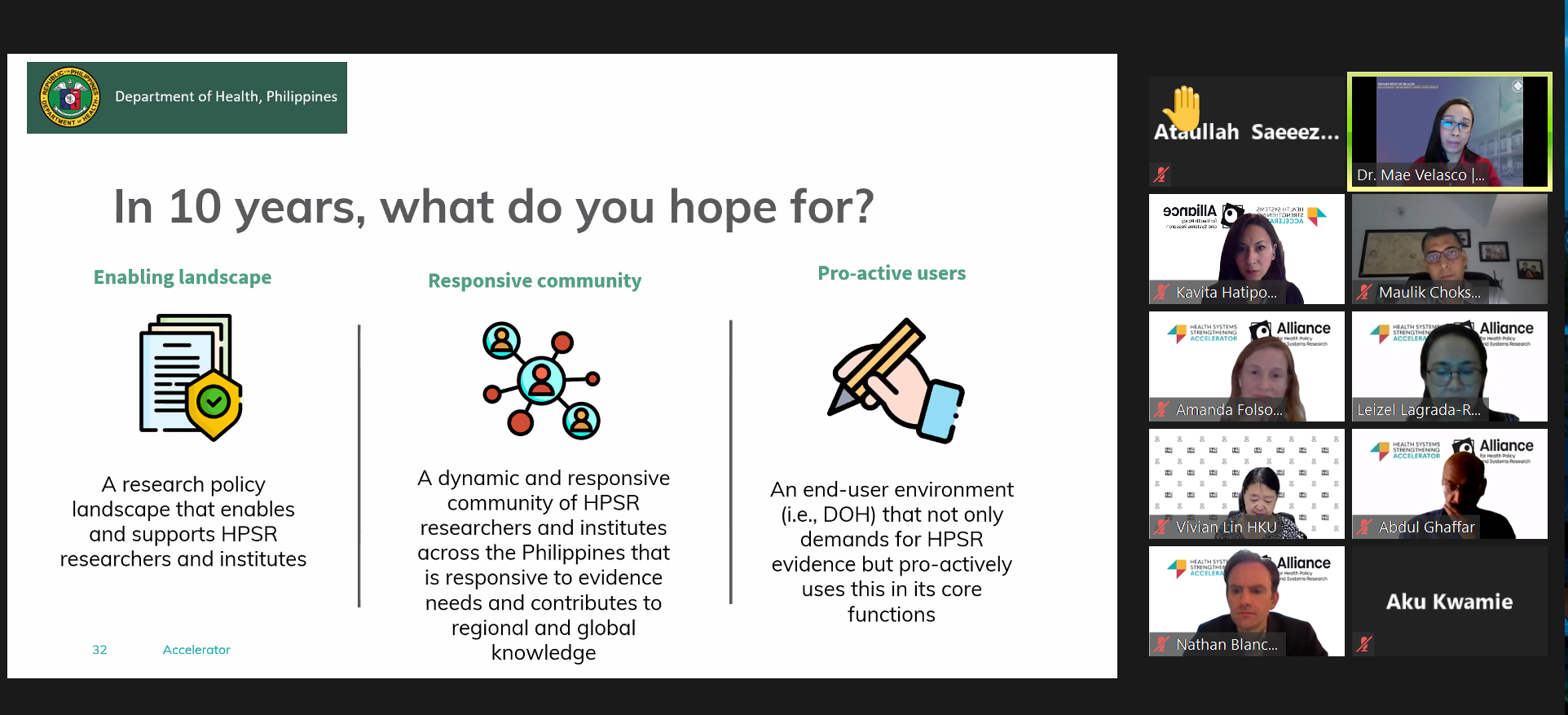Author: Leah List, Senior Program Associate, Results for Development

Strengthening the ecosystem for health policy and systems research in Asia will require building the capacity of health policy and systems research institutions (HPSRIs) to translate evidence into policy and practice. There is also a need to create sustainable platforms for collaboration and identify promising models to enhance HPSRIs to accelerate health systems strengthening. Throughout six co-creation sessions facilitated by the Accelerator, HPSRIs, learning platforms, and training programs in the Asia Region have begun creating a shared vision for raising the visibility of HPSRIs in the policymaking process. Sessions 1 and 2 explored the role of HPSRIs in the evidence-to-action cycle, the challenges they face, and how learning platforms can support them.
Session 3-6 built upon foundational discussions from the first two sessions to launch into the co-creation process and develop a shared vision for a more robust HPSR ecosystem in the Asia region. Five strong themes emerged as part of a shared vision from these discussions. According to participants, a stronger enabling health and systems policy research ecosystem would be:
- Increasingly domestically funded
- Characterized by strong demand for and use of evidence by policymakers and implementers
- Made up of robust HPSRIs
- Continuously strengthened through sustainable capacity development efforts supported by regional and global platforms
- Effectively measured & assessed to understand its strength and need for further strengthening
Participants envisioned a system of robust HPSRIs that reflect the plurality within countries in their research agendas and effectively work in partnership with each other. Training programs and learning platforms would continuously strengthen this system by identifying gaps in capacity and responding to the needs of HPSRIs and other essential actors and policymakers. These changes would be measured through various M&E tools to capture their efforts’ short and long-term impacts.
Achieving this vision will require strong collaboration between HPSRIs, learning platforms, and policymakers. “This [series] is a good opportunity for us to co-define concrete actions so we can move from idea to impact,” Anastasia Susanto, MCH Project Management Specialist, USAID Country Mission, said at the opening of the penultimate session of the series as participants moved toward developing action plans to operationalize the vision they’d refined. “What we could not achieve previously on our own, we can use this platform for.” In subsequent sessions, participants further explored this shared vision, creating over 65 pathways or models and beginning to co-develop action plans to achieve it.
Taking a 360-degree view
During this process, the importance of engaging with a wide range of actors at different levels of the country and expanding the definition of “stakeholder” came to the fore. Suppose the understanding of the network of influencers or stakeholders in a system is too narrowly defined. In that case, we may miss opportunities to address their different evidence needs and priorities and improve evidence uptake in the system. Dr. Shita Dewi stressed the importance of tailoring training programs when discussing the Indonesia Health Policy Network’s training programs to train fellows and subnational policymakers. “We need to be flexible and provide more support in developing knowledge products or completing an analysis [for policymakers].” ].” She explained that subnational policymakers learn the importance of evidence in solving their problems and developing policy options through the program.
This engagement must be systematic and deliberate, with a nuanced understanding of various stakeholder needs. Ideally, it should also transform policymakers into co-investigators who play an active role in the process, said Dr. Rajeev Sadanandan, Health Systems Transformation Platform. Through this, HPSRIs could better demonstrate their value in the implementation, potentially increasing domestic funding and achieving other components of the shared vision.
It is not enough to engage only with individual stakeholders, however. Achieving this vision also demands strengthening the capacity of institutions. Dr. Fadi El-Jardali reflected on this while explaining why the Knowledge to Policy (K2P) Center re-designed its capacity development approach. “We need to make sure training is integrated at the institutional level, so we minimize loss of learnings as individuals leave to ensure the programs are sustainable.” This drove home the value of taking a 360° view when evaluating the models and pathways participants had generated, fully considering who is part of the ecosystem, what it does, and how actors behave within the system.
As participants explored different angles to approach the challenges in their system and others, they raised some unique challenges. In particular, participants discussed key challenges in identifying or engaging with stakeholders during crises or in fragile states, especially as political actors or processes change. As part of this discussion, the importance of engaging the community was also raised. “Engaging the Community will help you identify some questions that you might not have considered in the first place,” emphasized Dr. Aleli Kraft, UPecon Foundation, “or that are not normally considered in the challenge is how to involve them in the research agenda-setting process systematically.”
Next Steps
Participants accomplished a lot in a short month, but the work does not end with the series. “We want to start by recognizing that the time has not been sufficient to fully develop and record the breadth of the ideas that the working groups have surfaced,” acknowledged Dr. Aku Kwamie, the Alliance, WHO. The series acted as a starting point where participants could honestly discuss challenges and freely explore ideas to solve them and achieve their vision of a stronger HPSR ecosystem. The Accelerator is reaching out to participants to facilitate the formation of “action groups” to take forward action plans and hopes to reconvene next year to assess progress. The Accelerator will also support the co-development of two resource banks (Catalogue of HPSR learning and training platforms; Landscape of HPSR ecosystem measurement and evaluation tools) and update the landscaping report that informed this series.
The series website will also remain active and be a central space for resources, updates, and dialogue.




